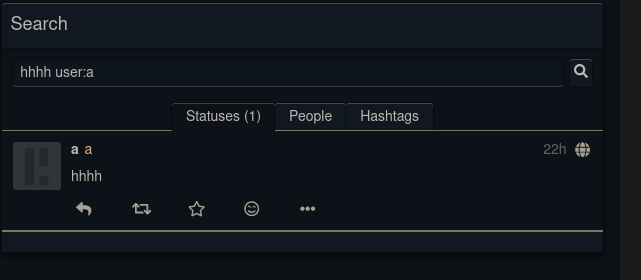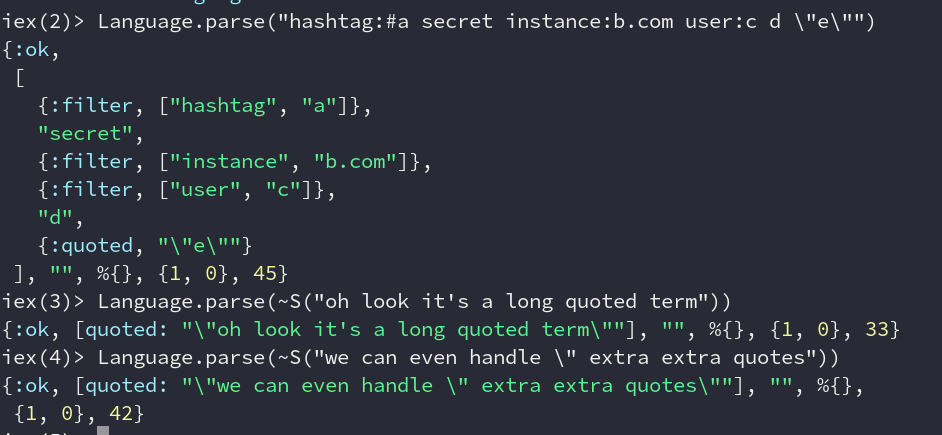Adding Elasticsearch Integration to Pleroma
If you've moved to Akkoma, this guide is OUTDATED, refer to the Akkoma docs if you still want to do this
Pleroma search sucks. Let's face it, it sucks. Searching through an entire postgres table for matches isn't exactly efficient, and it's common that absolutely nothing relevent is returned by your query.
So I, being very cool and also the best, have fixed this. For adequately low values of "fixed". Basically my solution is to shove activities, users and hashtags into elasticsearch indices and using the extremely good search provided therein.
It works nicely, it's about 3-4s to search all indices and handles just about everything you'd want. Less specific queries can take a few seconds more, but they time out after 5s so it's not the end of the world.
So it is time to walk you through how to set it up. This will require no previous ES knowledge.

WARNING: Only do this if you are technically competent and don't mind potentially resolving merge conflicts down the line.
You will need:
- Pleroma from source (OTP will not work)
- A VPS
- An elasticsearch installation (it's probably in your distro's repo, else see here)
First, please sweet jesus apply a password to your ES. Find your elasticsearch.yml (probably in /etc/elasticsearch) and add:
network.host: 127.0.0.1
http.host: 127.0.0.1
xpack.security.enabled: true
Then run elasticsearch-setup-passwords (probably in /usr/share/elasticsearch/bin) to set your passwords.
Check that ES is running with curl -u username:password http://localhost:9200/
Now we can get down to the complex stuff.
We'll need to add my personal git as a remote so you can merge my branch. There's a PR open on the repository showing the changes against mainline's develop just so you can be sure I'm not backdooring you or anything.
cd /path/to/peroma
git remote add elastic-fork https://git.ihatebeinga.live/IHBAGang/pleroma.git
git fetch elastic-fork
git merge elastic-fork/feature/elasticsearch
This has now added my changes, hooray. Now we need to configure it.
In config/prod.secret.exs:
config :pleroma, :search, provider: Pleroma.Search.Elasticsearch
config :pleroma, :elasticsearch, url: "http://localhost:9200"
config :elastix,
shield: true,
username: "my-user",
password: "my-password"
Change the URL, username and password as requried.
Now we need to create some indices. This isn't strictly neccesary but we're going to.
curl -XPUT http://localhost:9200/activities/ -u username:password
curl -XPUT http://localhost:9200/activities/activity/_mapping\?include_type_name --data-binary @priv/es-mappings/activity.json -H "Content-Type: application/json" -u username:password
curl -XPUT http://localhost:9200/users/ -u username:password
curl -XPUT http://localhost:9200/users/user/_mapping\?include_type_name --data-binary @priv/es-mappings/user.json -H "Content-Type: application/json" -u username:password
curl -XPUT http://localhost:9200/hashtags/ -u username:password
curl -XPUT http://localhost:9200/hashtags/hashtag/_mapping\?include_type_name --data-binary @priv/es-mappings/hashtag.json -H "Content-Type: application/json" -u username:password
Cool. Nice. Ok data time. This will take a while.
export MIX_ENV=prod
mix deps.get
mix compile
mix pleroma.search import activities
mix pleroma.search import users
mix pleroma.search import hashtags
This will import all old data from your postgres db into our indices.
You can keep track of your progress by running
curl http://localhost:9200/activities/_count -u username:password
curl http://localhost:9200/users/_count -u username:password
curl http://localhost:9200/hashtags/_count -u username:password
Now in theory you should be able to reboot your instance and have good, fast search.
Hooray.
Extra Info

Supported filters:
hashtag:#someTagorhashtag:someTaguser:someUsernameinstance:someinstance.net
Also supports "quoted terms" and just random terms